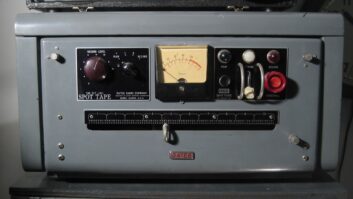On assignment for NRB Daily News, a sister publication to RW, I recently had the opportunity to interview Mark Zoradi, one of Hollywood’s most influential executives.
We discussed trends in motion pictures for my story in the Daily, which NRB convention attendees will read on site. But I was struck as well by certain parallels with radio that Zoradi unintentionally raised.
As president of the Walt Disney Motion Pictures Group, Zoradi oversees worldwide distribution and marketing of Disney and Touchstone Pictures films. Past jobs include marketing director for the Disney Channel, director of sales for Buena Vista Pictures Distribution, VP/GM of Buena Vista Television and then president of international theatrical marketing and distribution organization Buena Vista International, which under his guidance earned more than $1 billion at the international box office for 12 consecutive years.
This successful executive’s approach to his own industry can offer us several useful reminders.
What business are you in? — In radio we like to say content is king; but how often we forget it.
Zoradi puts it this way about the Disney philosophy: “We’re in the motion picture business. The essence of a great motion picture is telling a wonderful story. It starts and ends with the story. We try to never start a movie if we’re not passionate about the story it’s telling. It’s the essence of what we’re trying to do.”
How many people in radio can speak so clearly about what we do? Understand that we are in the business not of selling commercials but of creating compelling audio content that serves our listeners and clients.
Or as Zoradi has put it before, “Year after year, good product wins.”
Change is scary but it need not be fatal. — Zoradi knows all about the boom in consumer media choices including iPods, video games, DVRs and cellphones. In fact he began his career in 1980 as marketing manager for Walt Disney Home Video.
These are challenging to the future success of motion pictures, just as they are in radio. But he reminded me that the cinema is a century old and that over the years, many, many people have sung its death hymn prematurely.
Does that sound familiar?
Radio adapted when TV arrived, he said. TV adapted when cable came along. VCRs didn’t kill off movie-making. Lesson: Don’t let all the new media hype or years of flat radio revenue growth get you too down about our industry. Choose instead to be one of the people who are remaking the radio business model for a new millennium.
Smart businesses can flourish in hard times. — I asked Zoradi how the recent talk of recession affects his work day to day.
“From the world I live in at the Walt Disney Studios, if you look back historically, consumers around the world, not just in America, even in times of recessions, go to the movies. The same is true in regard to home entertainment.
“I’m hopeful our business is not adversely affected by potential recession; it’s a medium where you can entertain an entire family with a DVD or take them out to a relatively inexpensive evening at the theater.”
Radio too is well positioned to take advantage of a sour economic mood by highlighting our free, compelling audio content — and creating more of it.
Don’t fear digital. — The next 12 to 36 months will bring the motion picture industry to a digital tipping point, Zoradi said.
“There are several thousand digital houses now; 35mm won’t be the dominant mode of exhibition, truly, in the next five years,” he continued, suggesting that his industry should not be afraid to embrace digital projection. When theaters do change over, it simply means the way the movie is shown in the theater will change. “It will allow the exhibitor more flexibility in scheduling and in quality.”
Digital can offer great benefits to radio, as well. Too many people run from it because it is a change in their familiar way of doing things, rather than exploring the benefits it may offer.
Understand your local audience. — Disney has a great deal at stake in how it exports its American-based, American-generated entertainment.
It invests in local staffing of 27 offices around the world and takes great care in dubbing, subtitling and marketing.
For example, Zoradi says, when distributing a movie with a strong comedic angle in Japan, Disney may play up the emotional angle to the story more “because the emotions travel well, where comedy is more culturally sensitive. You do that having people on the ground who understand that culture.”
While Disney’s international marketing is not directly comparable to U.S. radio, the underlying point is that the company knows it needs to understand the local market where the product plays. Localism, or at least an investment in local awareness, is key.
Too much, too fast? — Disney used to crank out 20 movies a year but now the company intentionally produces only about a dozen, including one or two key releases around the holidays and another batch in summer.
“We’re making a few less, but we’re putting more into each one,” Zoradi said. When you do that, you can be choosier.
Radio can learn from this. In our chase to explore exciting new media outlets, we must not dilute our core product. Just because a cluster has five Internet streams and 10 multicast channels doesn’t mean we are producing quality on each of those, much less our main air product.
In fact, without a conscious commitment to quality, it may mean just the opposite.
If you are headed to the NRB convention in Nashville next month, you can see Mark Zoradi along with talented animator Glen Keane speak at the Sunday evening session “The Power of a Story.” Visit www.nrbconvention.org. RW’s convention preview appears in our March 1 issue.







